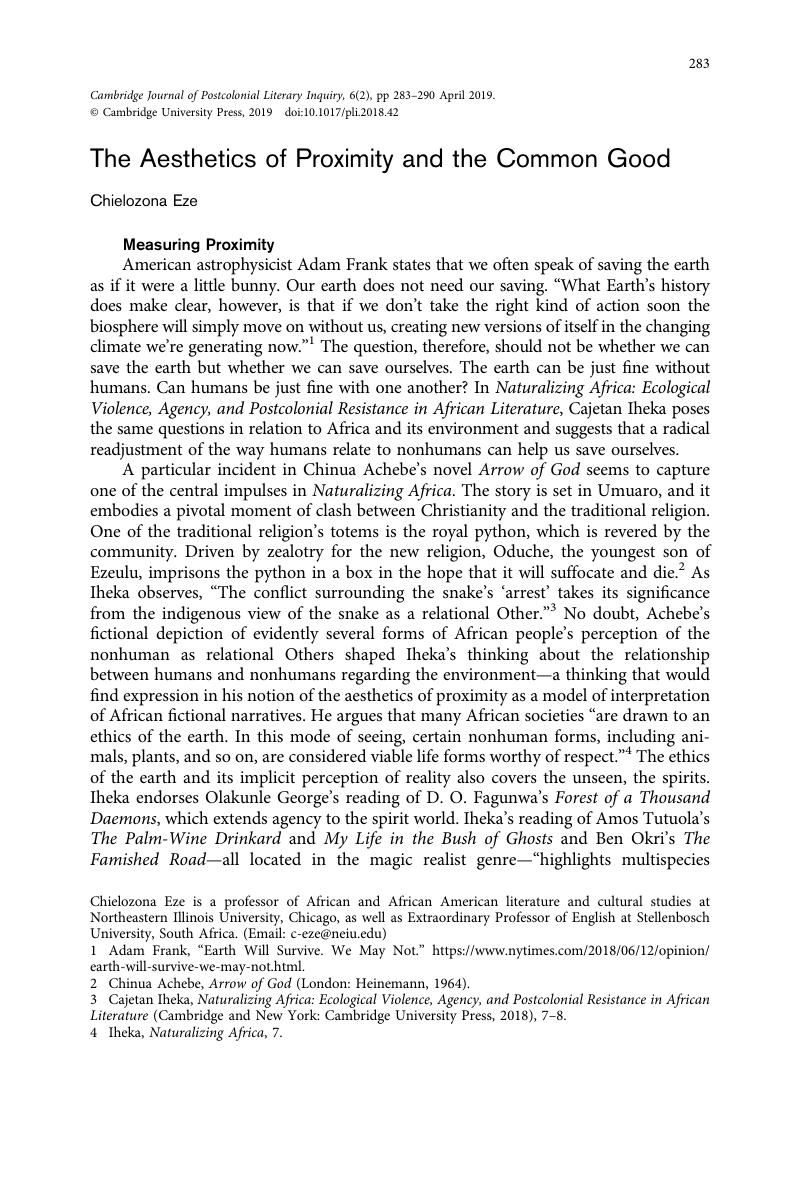Article contents
The Aesthetics of Proximity and the Common Good
Published online by Cambridge University Press: 26 March 2019
Abstract

- Type
- Book Forum on Cajetan Iheka’s Naturalizing Africa
- Information
- Cambridge Journal of Postcolonial Literary Inquiry , Volume 6 , Issue 2 , April 2019 , pp. 283 - 290
- Copyright
- © Cambridge University Press 2019
References
1 Adam Frank, “Earth Will Survive. We May Not.” https://www.nytimes.com/2018/06/12/opinion/earth-will-survive-we-may-not.html.
2 Achebe, Chinua, Arrow of God (London: Heinemann, 1964)Google Scholar .
3 Iheka, Cajetan, Naturalizing Africa: Ecological Violence, Agency, and Postcolonial Resistance in African Literature (Cambridge and New York: Cambridge University Press, 2018), 7–8 Google Scholar .
4 Iheka, Naturalizing Africa, 7.
5 Iheka, Naturalizing Africa, 17–18.
6 Iheka, Naturalizing Africa, 23.
7 See Mbiti, John, African Religions and Philosophy (Oxford: Heinemann International, 1990 [1969]), 102 Google Scholar .
8 Taringa, Nisbert, “How Environmental Is African Traditional Religion?” Exchange 35.2 (2006): 191–214 CrossRefGoogle Scholar . Taringa argues that the ecological attitude of traditional African religion is based more on fear or respect of ancestral spirits than on respect for nature itself.
9 Pinker, Steven, Enlightenment Now: The Case for Reason, Science, Humanism, and Progress (New York: Viking, 2018)Google Scholar .
10 Iheka, Naturalizing Africa, 2, 13.
11 Iheka, Naturalizing Africa, 23.
12 Iheka, Naturalizing Africa, 13.
13 The Whirled Bank Group, http://www.whirledbank.org/ourwords/summers.html (accessed February 2, 2018).
14 The Whirled Bank Group.
15 Trahair, Richard C. S., From Aristotelian to Reaganomics: A Dictionary of Eponyms with Biographies in the Social Sciences (Westport, CT: Greenwood, 1994), 343 Google Scholar .
16 Lindqvist, Sven, “Exterminate All the Brutes”: One Man’s Odyssey into the Heart of Darkness and the Origins of European Genocide (New York: The New Press, 1997)Google Scholar .
17 Aristotle, Politics and Poetics, trans. Benjamin Jowett and S. H. Butcher, book 1, chapters 1, 5 (New York: The Heritage Press, 1964).
18 Frede, Dorothea, “The Political Character of Aristotle’s Ethics,” in The Cambridge Companion to Aristotle’s Politics, eds. Marguerite Deslauriers and Pierre Destrée (Cambridge: Cambridge University Press, 2013), 14–15 CrossRefGoogle Scholar .
19 Morrison, Donald, “The Common Good,” in The Cambridge Companion to Aristotle’s Politics (Cambridge: Cambridge University Press, 2013), 177–178 Google Scholar .
20 Donald Morrison, “The Common Good,” 182.
21 Iheka, Naturalizing Africa, 159.
22 Iheka, Naturalizing Africa, 161.
23 Iheka, Naturalizing Africa, 161.
24 Maathai, Wangari, Unbowed: A Memoir (New York: Anchor Books, 2007)Google Scholar .
25 For more on Mandela and Tutu in this regard, see Eze, Chielozona, Race, Decolonization, and Global Citizenship in South Africa (Rochester, NY: University of Rochester Press, 2018)Google Scholar .
26 Maathai, Wangari, “Nobel Peace Prize Speech: Nobel Lecture, Oslo, 10 December 2004,” Meridians: Feminism, Race, Transnationalism 6.1 (2005): 200 CrossRefGoogle Scholar .
27 Maathai, “Nobel Peace Prize Speech,” 201.
28 Maathai, Wangari, The Challenge for Africa (New York: Pantheon, 2009), 164 Google Scholar .
29 Maathai, The Challenge for Africa, 160–61.
30 Frankfurt, Harry, Taking Ourselves Seriously and Getting It Right (Stanford, CA: Stanford University Press, 2006)Google Scholar .
31 Maathai, The Challenge for Africa, 164–65.
32 Maathai, The Challenge for Africa, 165.
33 See Arendt, Hannah, The Human Condition (Chicago, IL: University of Chicago Press, 1958)Google Scholar .
34 Maathai, The Challenge for Africa, 165
35 Maathai, The Challenge for Africa, 166.
36 Maathai, The Challenge for Africa, 166.
37 Maathai, The Challenge for Africa, 170.
38 Maathai, The Challenge for Africa.
39 Maathai, The Challenge for Africa, 170–71.
40 For a reading of this proverb, see Biodun Jeyifo, “Where One Thing Stands, Another Thing Will Stand Beside It: Life Expectancy and the HDI.” http://thenationonlineng.net/one-thing-stands-another-thing-will-stand-beside-life-expectancy-hdi/.
- 1
- Cited by


